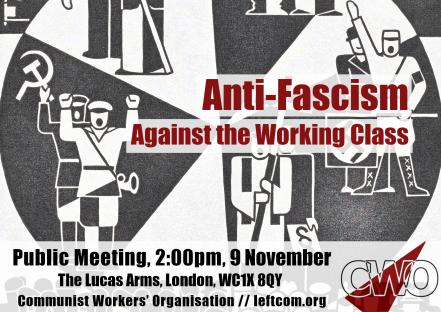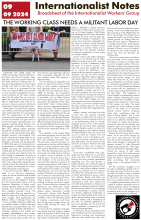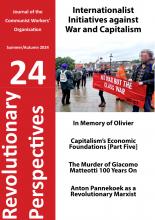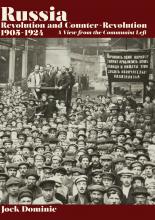September 2024
Why is the proletariat passive?
In recent correspondence, amongst other points this was raised
_"I think that perhaps the subjective factors are overestimated
by your assessment of the causes leading to the passivity of the
proletariat in front of the bourgeois attacks. Of course, I’m not
implying by this that the bourgeois pseudo-socialist forces and the
trade unions shouldn’t be combated."
_
We do report on the many instances of proletarian resistance, but I think that some may be wondering why the proletariat has not hit back with much greater force than it has. I would tend to accept that the objective factors are much more important than ideological factors etc and the simple fact is that the crisis has yet to intensify before the class responds on the scale that makes revolution the likely outcome, rather than the barbarism that is on the ascendency today. Despite capitalism's difficulties, its resort to debt/speculation/super exploitation in certain areas (China etc) have deferred the day of reckoning.
Of course the deadening hand of reformism/unionism etc can delay the inevitable avalanche, and the interventionof revolutionaries can accelerate it, but that is not to say that the inevitability of a massive class response is questioned.
One aspect of this is the question of time limits. I think this may be of great importance vis a vis the environmental question, because there is a possibility of a tipping point beyond which catastrophe is inevitable.
A different question is the nature and outcome of such massive class struggle. Here the subjective factor, the rise of revolutionary consciousness is very important, but it is not in any way separate from the objective, the material reality and the two are bound together and condition each other.
Start here...
- Navigating the Basics
- Platform
- For Communism
- Introduction to Our History
- CWO Social Media
- IWG Social Media
- Klasbatalo Social Media
- Italian Communist Left
- Russian Communist Left
The Internationalist Communist Tendency consists of (unsurprisingly!) not-for-profit organisations. We have no so-called “professional revolutionaries”, nor paid officials. Our sole funding comes from the subscriptions and donations of members and supporters. Anyone wishing to donate can now do so safely using the Paypal buttons below.
ICT publications are not copyrighted and we only ask that those who reproduce them acknowledge the original source (author and website leftcom.org). Purchasing any of the publications listed (see catalogue) can be done in two ways:
- By emailing us at uk@leftcom.org, us@leftcom.org or ca@leftcom.org and asking for our banking details
- By donating the cost of the publications required via Paypal using the “Donate” buttons
- By cheque made out to "Prometheus Publications" and sending it to the following address: CWO, BM CWO, London, WC1N 3XX
The CWO also offers subscriptions to Revolutionary Perspectives (3 issues) and Aurora (at least 4 issues):
- UK £15 (€18)
- Europe £20 (€24)
- World £25 (€30, $30)
Take out a supporter’s sub by adding £10 (€12) to each sum. This will give you priority mailings of Aurora and other free pamphlets as they are produced.
ICT sections
Adverts
Glasgow Bookfair
RED AND BLACK CLYDESIDE BOOKFAIR
The CWO will have a stall at the Red and Black Clydeside Bookfair, there will also be an NBWCW meeting.
When: Saturday, 7 December 2024
Where: TBA
London Public Meeting
ANTI-FASCISM AGAINST THE WORKING CLASS
PUBLIC MEETING AND DISCUSSION
On 30 July riots broke out across the UK which targeted Muslim neighbourhoods and places sheltering migrants, following a stabbing in Southport the day before. The riots were fuelled by fascist groups and far right websites spreading the conspiracy theory that the attacker was a Muslim asylum seeker.
Decades of racist propaganda from mainstream news sources, which blame immigrants for workers’ decline in their standard of living, have led to many thinking that immigration into Britain is the cause of reduced wages, homelessness, a collapsing health service, failing schools etc. rather than increased exploitation of the working class and capitalism’s economic crisis.
The response to this from capitalism’s political left has been to organise against fascism, with national demonstrations of the ‘great and good’ against the riots and against racism in defence of democratic freedoms. But fascism and democracy are simply strategies of the capitalist class to continue exploiting us. Strategies they use to recruit us to fight their wars. Organising specifically against fascism, amounts to supporting one section of the capitalist class against another. It is still in favour of the capitalist system. What we need is to oppose the entire capitalist system through the broader class struggle, leading to the eventual overthrow of capitalism itself.
While other approaches to anti-fascism involve small groups, engaged in physical confrontations with fascists, it is an approach that similarly offers no solutions to a system that breeds racism.
We argue that only the end of capitalism can put an end to poverty, misery and racism and only the working class can achieve this.
Come join us in a public meeting to discuss this.
When: Saturday, 9 November 2024, at 2:00pm
Where: The Lucas Arms, 245A Grays Inn Rd, London, WC1X 8QY (nearest tube: King's Cross)
Communist Workers' Organisation
IWG Meetings
IWG MEETINGS
The IWG will be holding regular in-person meetings where sympathizers are encouraged to come and get in contact.
New York: Last Saturdays of the month 3:30pm at Peculier Pub (145 Beecker St)
Philadelphia: Last Saturdays of the month 11am at B2 cafe (1500 E Passyunk Ave)
Lambertville, New Jersey: Tuesdays 8/13, 8/20, and 8/27 at 7 PM in the Lambertville Library (6 Lilly Street, Lambertville, NJ), for discussions on the Russian Revolution and Counter-Revolution.
Columbus: Last Sunday of every month, from 8PM-10PM, at Kafe Kerouac (2250 N High St, Columbus, OH).
Los Angeles: Please contact to get in touch.
Means of contact:
Email: us@leftcom.org
Instagram: @iwg.official
Facebook: @iwgusa
Twitter: @IWGOfficial
Recent publications
August 2024
Aurora is the broadsheet of the ICT for the interventions amongst the working class. It is published and distributed in several countries and languages. So far it has been distributed in UK, France, Italy, Canada, USA, Colombia.
Out now!
Journal of the Communist Workers’ Organisation -- Why not subscribe to get the articles whilst they are still current and help the struggle for a society free from exploitation, war and misery? Joint subscriptions to Revolutionary Perspectives (3 issues) and Aurora (our agitational bulletin - 4 issues) are £15 in the UK, €24 in Europe and $30 in the rest of the World.
Written by Jock Dominie. £12, 276pp.
The Russian Revolution remains a landmark event in history. For the bourgeois historians, the October Revolution is thought to be a tragedy that set back the achievements of the “democratic” February Revolution, and allowed the Bolsheviks to wreak havoc on their citizens and the world. For the Stalinists, the events of 1917 paved the way for the birth of the USSR, which they point to as a prototypical example of “socialism in one country”. In reality, the February and October Revolutions were both part of the same proletarian revolution.
The book can be ordered by emailing us at uk@leftcom.org and asking for our banking details, or by donating the cost of the publications required via Paypal using the “Donate” button. Postage charges should be added. If in the UK, and paying direct to our bank account, first class postage is free. If via Paypal add £2. For Europe cost of a copy with postage is €20 (EUR), for Australia it is $42 (AUD) and for the USA and anywhere else in the world it is $27 (USD).
User login

This work is licensed under a Creative Commons Attribution 3.0 Unported License.









The Maoist website LLCO.org
The Maoist website LLCO.org its explanations as to lack of resistance in what it terms 'the First World'. They seem worth noting, whatever the opinions of them.
It’s unquestionable that the
It's unquestionable that the response from the working class in Britain and elsewhere has not matched the attacks from the bourgeoisie. As Stevein points out the reason for this is complex and includes the interaction of both objective as well as subjective circumstances. One reason for the lack of a generalised fightback is in many ways due to the success of the bourgeoisie in applying a media blackout regarding any strikes. It's without doubt that strikes are taking place today but we simply do not hear of them. The reason for this is that the bourgeoise learnt the lessons from the 1970's when there was much more of a tendency to report strikes in the media. This reporting helped to create a feeling that other workers are fighting back and encouraged a fighting spirit after all there is nothing like publicity to break down that sense of isolation and individualism that is endemic in capitalist society. Today nothing which leads many workers into believing that no one is fighting back and discourages a fightback. Of course this isn't to deny the objective circumstances such as crisis of profitabilty in relation to competitors, restructuring of the labour market, structural unemployment etc. What I am saying is that the strikes that do occur tend to be localised and remain largely unknown. When they do occur they also tend to remain on the terrain of the bourgeoisie i.e. led by the trade unions with an input from various Trotskyists. It's against this scenario that we as left communists operate to try to intervene as effectively as possible given our small size and limited resources. The task is to try to shift workers perspectives away from a capitalist perspective to a communist one and in the process change the subjective into an objective force of revolution.
I’m sure Dave is right in
I'm sure Dave is right in saying that the bourgeoisie's media blackout on strikes and any working class activity works quite well for them. There's also the point that the slow realization by workers of what lies in front of them and what they are required to do i.e. combat the whole system internationally, must be very daunting. Then there's Stevein's point: "One aspect of this is the question of time limits. I think this may be of great importance vis a vis the environmental question, because there is a possibility of a tipping point beyond which catastrophe is inevitable." It is unpleasant to have to admit it, but the decomposition of both the environment and society pose a real threat to the chances of revolution. Time is not on our side.
One thing in our platform I
One thing in our platform I think is not so certain,
The tragic identification of state ownership with socialism has been brought to an end now that so-called soviet society [has returned] to the organisational and legal set-up of classical (i.e. Western) capitalism
Is it so clear?
Can”>cbg.110mb.com I submit
Can I submit this 20 year-old open letter written by someone in what was the CBG, not in any way to open old wounds, but because it seems to me to raise questions that the milieu has still to address.
Re Shugs letter, I recall at
Re Shugs letter,
I recall at a recent CWO meeting something on the lines that it is not possible that the class struggle could escalate to the point of construction of councils without there being at the same time a huge growth in the advanced revolutionary vanguard, i.e. the party, as if that was an obvious and automatic relationship. Forgive me if memory does not present it well.
That letter made me reconsider the preposition. the crisis is here and deepening. The class is responding however wrongly and in a limited way, but we expect that to increases as the crisis intensifies, as our theory says it must.
Now that seems relatively secure. Intensifying crisis, greater level of social unrest including indiustrial unrest. Not 100% absolutely watertight, but a fair prediction.
The problem is that of revolutionary class consciousness which is a far leap from fighting on the terrain of demands, defense etc.
I don't think there is any automatic correlation between a huge wave of class struggle and the generalisation of revolutionary class consciousness, though the former seems to be an indispensible element in that latter possibility.
I think it possible that the revolutionary minority will be much smaller than the Bolshevik example cited in the letter, and that as such its chances of victory are reduced but still remain.
As long as the revolutionary perspective can penetrate the councils and dominate at the highest level, it is not relevant that those who accept it are initially party members.
I am suggesting that a small determined force of revolutionaries could still have a decisive influence, though I doubt it and I hope this is not the case. Nonetheless, one man can move a mountain if willing.
Again, the probabilities are mounting up against successful outcome if the revolutionary organisation pre - councils cannot muster some strength beyond what could fit on a bus or two, but in all situations the possibilities remain open.
This perhaps contradicts the general lesson of the failed German revolution which says that the attempt to build a revolutionary organisation in the midst of the most intense upheaval is too little too late. I think it is not absolutely true, although very likely to be true.
....and Rosa did not have internet.